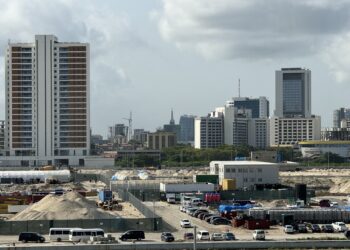I had a meeting last night at one of those pretentious restaurants that litter Lagos Island. This one was in Lekki Phase 1, with beautiful interiors and ambiance carefully designed to prepare you to be duped.
My acquaintance had asked me to meet him there Friday night to finish discussions on some transactions.
The place was virtually empty, with waiters numbering much more than customers, and I shrugged, blaming it on the dire situation of the economy.
I ordered chicken wings and requested an additional portion as a takeaway. My friend ordered rice, lamb chops, and a drink. I opted for water with lemon, and that was it.
When the bill came, I quickly brought out my card, intending to score one against my billionaire friend, only to receive the shock of my life.
The total bill was N106,000, and I was also expected to tip the waitress.
I lost my composure and asked very politely, but with contained anger, “What did we eat to warrant this?” Six chicken pieces, a morsel of rice, a plate of lamb chops, and water with one pink drink? And these people are now taking me to the cleaners?
I paid and walked away, swearing never to set foot in that establishment again.
This morning, the economics of it hit me. They would hide under the rising cost of their business to profiteer. They will shout diesel costs, the cost of food ingredients, taxes, staff costs, and all the other costs that are inputs to a business in a hyperinflationary environment.
So, to mute the galloping cost, they push margins, which are expected to serve as a buffer for them, especially in the arena of replacement cost.
My friend, who also runs an AB&B in the same Lekki area, faces similar challenges. A plate of Afang is N11,000, the protein charges separately at N4,000, the swallow N6,000, and the water N3,500. So, for a well-made meal, he has spliced the pricing to arrive at a wholesome N23,500.
Now, the mistake here is the lack of creativity. I understand that they all plan to play in a niche market, but their pricing now takes them away from their natural market delineation based on capacity, service, and location and dumps them into another service level that they cannot play in.
So, like I told Tayo, instead of eating a bowl of Afang in your bedsit nestled in Lekki for N22,000, I’d rather go to the Marriott or Cactus and invest N40,000 for a good meal with the world-class service and networking opportunity that comes with it.
Last night, for the three hours I stayed there, I counted only six patrons, and if you average it out, they would have generated roughly N1 million in sales for that period.
Remember, this is a Friday night when Lagos is alight. So, I can risk it and halve this by 50% for the other days of the week.
So if its proprietors are not into money laundering and using this as a front, then this is a loss-making venture that will soon shut down, no matter the number of beautiful waitresses they adorn the place with.
This leads me to the chicken and egg situation the Nigerian economic milieu has led entrepreneurs into. Profiteering has now become a legitimate instrument of business survival.
Nobody is talking about business success anymore, but business survival, and to survive, you throw your cost at the market, which in turn is suffering from severe erosion in purchasing power.
The government is showing a lack of creativity in opening up the economy with retail-bursting policies that will grow it. Businesses are also showing a lack of creativity in tackling the issues, and the harried market is also voting with their diminished pockets, leading to systemic business collapse and its attendant loss of revenue for the government, which now responds by hiking taxes or creating new tax lines, which finally worsens the whole thing.
It’s a whole vicious circle of thoughtlessness on every stakeholder’s part – Government, businesses, and the markets. Everybody in the space has been zombified into a lethargic and robotic approach to macro and microeconomic issues that can be easily resolved through creative thinking.
I have heard that most SMEs collapse after 5 years if not less. Why won’t it collapse when you are charging N106,000 for 8 pieces of chicken?
If I were to advise these small businesses, it would be to go retail. Drop the prices, and struggle to maintain quality. This will drive traffic and give you weight to determine some of your costs as a result of the wholesome purchases that you would be making.
Outlets like Blackbell and Jevnik to a large extent have the formula and have been cashing out. With ₦20,000, you can have a very good quality meal in a beautiful ambiance; hence the constant flow into their outlets.
Now compare this with those who open a huge complex, decorate it to high heavens, and only 6 people come out on a bustling Friday to eat.
What they should realize is that we no longer have a middle class in the real sense of the word. Between Buhari and Tinubu, that economic grouping has been obliterated. We now have Rich, poor, and peasantry.
Most of us, including the writer, are categorized as poor and, as such, with no purchasing power to sustain the over 3m SMEs that play in markets that offer goods and services whose demand is inelastic.
So except these proprietors are drug dealers and money launderers who open up these outlets to wash their funds, they cannot survive as they all have to push towards the population who earn ‘free’ money from illicit dealings or from ladies of easy virtue who earn almost free money and who really don’t have a cost of living beyond the monthly medical check-up for sustenance.
What is really needed in this kind of business is to seek a sustaining creative marketing strategy that would reduce costs, and push and pull in traffic while keeping pricing at an affordable level.
It is not to go carry 8 pieces of the chicken wing with a candle flaring in the night and be saying – Mr. Edgar, your meal, after which they will now give me a bill that is almost triple the official minimum wage.
I’m not hungry, please.
Thanks























